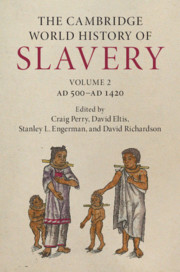Book contents
- The Cambridge World History of Slavery
- The Cambridge World History of Slavery
- The Cambridge World History of Slavery
- Copyright page
- Contents
- Figures
- Contributors
- Chapter 1 Slavery in the Medieval Millennium
- Part I Captivity and the Slave Trade
- Part II Race, Sex, and Everyday Life
- Part III East and South Asia
- Part IV The Islamic World
- Chapter 14 Slavery in the Islamic Middle East (c. 600–1000 CE)
- Chapter 15 Military Slavery in Medieval North India
- Chapter 16 Slavery in the Mamluk Sultanate
- Chapter 17 Slavery in the Early Modern Ottoman Empire
- Part V Africa, the Americas, and Europe
- Index
- References
Chapter 17 - Slavery in the Early Modern Ottoman Empire
from Part IV - The Islamic World
Published online by Cambridge University Press: 09 September 2021
- The Cambridge World History of Slavery
- The Cambridge World History of Slavery
- The Cambridge World History of Slavery
- Copyright page
- Contents
- Figures
- Contributors
- Chapter 1 Slavery in the Medieval Millennium
- Part I Captivity and the Slave Trade
- Part II Race, Sex, and Everyday Life
- Part III East and South Asia
- Part IV The Islamic World
- Chapter 14 Slavery in the Islamic Middle East (c. 600–1000 CE)
- Chapter 15 Military Slavery in Medieval North India
- Chapter 16 Slavery in the Mamluk Sultanate
- Chapter 17 Slavery in the Early Modern Ottoman Empire
- Part V Africa, the Americas, and Europe
- Index
- References
Summary
This chapter examines the social history of slavery in the early Ottoman Empire. Arguing that the range of forms of enslavement and forced labour practiced in the Ottoman Empire cannot be described by the current ‘universal’ definitions of slavery, this chapter looks at the role of slavery in Ottoman dynastic politics, the social history of military and administrative slavery, and the slavery of skilled workers as central to the economic production of the early modern urban centres of the Ottoman Empire. The chapter concludes with an examination of the legal categories that were applied to different forms of slavery and manumission, and presents to the reader to a range of primary and secondary sources for the research of slavery in the Ottoman Empire.
- Type
- Chapter
- Information
- The Cambridge World History of Slavery , pp. 406 - 428Publisher: Cambridge University PressPrint publication year: 2021
References
A Guide to Further Reading
- 1
- Cited by

